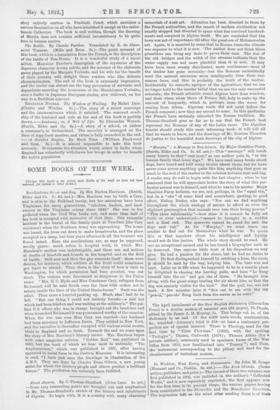SOME BOOKS OF THE WEEK.
[Under this headl 1g ue colic. such Rooks of the wed as have not bun reserved for review t,. other formal Recollections, Grave and Gay. By Mrs. Burton Harrison. (Smith, Elder and Co. 7s. 6d. not.)—Mrs. Harrison was by birth a Cary, and is akin to the Falkland family, but her ancestors have been Virginians for many generations, " scholars, leaders, and land- owners in the Virginian colony since 1640." She was in her girlhood when the Civil War broke out, and more than half of her book is occupied with memories of that timo. One romantic incident is the burial of the family plate at Vauclure (the Cary residence) when the Northern Army was approaching. The house was burnt, the trees cut down to make breastworks, and the place occupied as a camp, but four years afterwards all the treasure was found intact. Hero the recollections are, as may be supposed, mostly grave : much refers to hospital work, in which Mrs. Harrison's mother was indefatigable, and there are sad notices of deaths of kinsfolk and friends in the hospital and on the field of battle. Still now and then the gay reasserts itself : there were dances, for instance, which soldiers at the front could sometimes get leave to attend. Then there is the story of how a visit to Washington, for which permission had been granted, was cut short. The visitors were denounced as dangerous to the Union cause, "Mrs. E. C. Hyde and Miss Constance Cary, refugees from Richmond, will be sent South over the lines with orders not to return inside the lines of the United States forces." Such was the edict. Then came a hurried packing up. Much, alas 1 had to be left. "But one thing I could not entirely forsake—a new hat which had been tried on and was waiting at the milliner's." The gal- lint U.S. officer who was in charge brought out the band-box and when it reached Richmond it was pronounced worthy of the occasion. When the war was over Miss Cary was married—her husband had boon secretary to Jefferson Davis. They settled in New York, and the narrative is thereafter occupied with various social events, visits to England and so forth. Towards the end we come upon the story of Mrs. Harrison's literary career. Mrs. Harrison began with some magazine articles. "Golden Rod." was published in
1880, but the book of which wo hear most is naturally " The Anglomaniacs," which .was published in 1887, after having
appeared in serial form in the Century Magazine. It is interesting to read, "I have just seen the drawings in illustration of the A.M.S. They are done by Charles Dana Gibson, a new young artist for whom the Century people and others predict a brilliant future." The prediction has certainly been fulfilled.














































 Previous page
Previous page